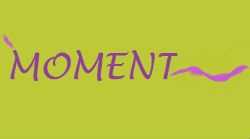Moment is Movement
moment and my newt
Equinox is like twilight: midway point on the way to solstice, or to midday/midnight, point at which momentum has built so the energy is solidly toward more light, more heat, more day (or, in September, more dark, more cold, more night).
If you're paying attention, you can feel the energy change over. But, as I said in the equinox post, it doesn't all happen right in the key moment. Momentum builds to that point and continues for some time afterward.
And so this spell's "word" post is dedicated to moment/momentum.
It's sort of a "two-fer," because a moment is an instant of time, or also a measure of importance (cf. "an announcement of great moment," or "a momentous occasion"), or also a degree of force exerted by a lever to make something turn, whereas momentum is attributed to an object, referring to that object's being in motion in a certain direction and being likely to remain in motion in that direction.
On the other hand, moment and momentum both come from later Latin momentum, and this is a syncopated form of a Latin word that will look familiar--movimentum. ("Syncopated" means it dropped a syllable--that little "vi" syllable--it's like skipping a beat in music.)
So, there's something deeply similar in the energy leading up to an instant--like all the intense energy that pushed us into the equinox--and the instant itself.
People who write the etymological dictionaries argue over how "movement" comes to mean moment in the sense of a small amount of time. One of the most popular explanations imagines the smallest particle necessary to move a scale. But isn't this confusing moment with minute?
Minute legitimately has something to do with smallness. Pronounce it differently and you're describing something very small (the first time I heard it, aged 5, I thought someone was referring to her newt!); the word is connected with minus.
I remember being even younger than when I thought "minute" was someone's pet amphibian, puzzling out the difference between minute and moment. People seemed to use them interchangeably in some contexts but not in others. Only people who spoke with certain accents would say "at the minute" instead of "at the moment," for example. And people said "enjoy the moment" but not "enjoy the minute," and you could have "up-to-the-minute news" but not "up-to-the-moment" news.
The best I could figure out was that there are no moments on a clock face. You don't tell time in moments. A little older, when I started to use a protractor, I saw the correlation between minutes of time and degrees in space--minutes stayed in the arena that strives for precise measurement, whereas moments showed up in physics class as pivotal points of leverage.
So, minutes march in constant linearity, whereas moments are those pivotal leverage points that seem to exist outside of ordinary time. The wonderful thing, though, is that "outside of ordinary time" doesn't mean moments are standstills.
They say, "the present moment is all that we have." And they say, "all you can do is respond, moment to moment to moment."
And they also say, "Look at where you came from as well as where you're headed to."
It's all very well to live in the present moment, but that moment is movement, and is moving, and is part of a string of moments in momentum.
In the moment, you're frustrated because you made a grammatical error in Spanish, but you track momentum backward and recognize that you couldn't put together a sentence in Spanish two months earlier.
In the moment, you've forgotten where you put your keys. Track the momentum backward and realize this has become a frequent occurrence, and you'll decide to find a way to change that onward momentum.
Recognizing moment as movement helps us to get away from the belief that "living in the moment" means forgetting about the past and future, which is a fallacy, and which puts skeptics off the whole idea of presence. When you acknowledge that moment is a part of momentum, you can see that past and future are actually part of the moment.
About the Author
Ela Harrison
Ela is a wordsmith and herb lover who has lived in many places and currently resides in Tucson, AZ.
